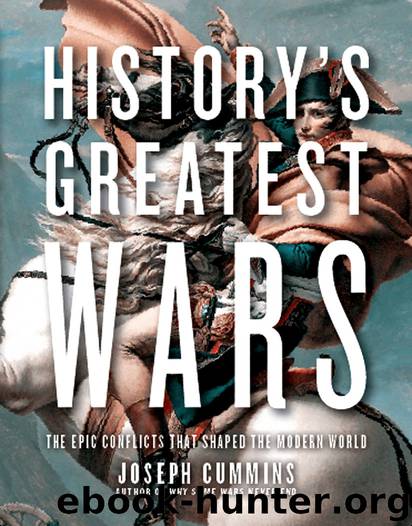History's Greatest Wars by Joseph Cummins

Author:Joseph Cummins
Language: eng
Format: epub
Publisher: Rockport Publishers
Published: 2011-03-21T16:00:00+00:00
THE BATTLE OF VALMY WAS ONE OF THE MOST IMPORTANT CLASHES IN WORLD HISTORY. WITHOUT THE FRENCH VICTORY THERE WOULD HAVE BEEN NO SUCCESSFUL FRENCH REVOLUTION AND NO NAPOLEONIC WARS.
Battle of Valmy, 20th September 1792, 1835 (oil on canvas) (detail of left hand side), Mauzaisse, Jean Baptiste (1784-1844) / Louvre, Paris, France / The Bridgeman Art Library
A Kind of Blood-Red Tint
Brunswick and other Coalition officers expected the French to run at the first sound of the guns, to be chased down by the cavalry and slaughtered. After all, these soldiers had not made a stand since the war began. But the unexpected happened: With an answering roar, the French artillery opened up, and the Battle of Valmy was on.
French soldiers rammed home shot after shot, sweating even on the cool day, and watched with cheers as they struck home among the massed Prussian troops. And Prussian cannonballs did their work among the French, although because of the wet ground—which caused the round shot to stick in the mud, rather than bounce murderously through the ranks—there were fewer casualties on both sides than otherwise might have been expected.
Valmy has been called one of the strangest great battles in the history of the world. It was essentially a battle fought by cannonade, which went on for hours. Goethe himself, riding through the shelling with a young man’s foolish curiosity, compared the sound of the thousands of shots fired to “the humming of tops, the gurgling of water, and the whistling of birds.” As the cannonade continued, Goethe claimed that he began to see the world around him as if through “a kind of blood-red tint”—an observation that might seem fanciful, but that has been repeated by other soldiers caught in intense artillery fire.
Finally, early in the afternoon, Brunswick decided to attack, but his men immediately met a killing field of accurate cannon fire and withdrew. At this point, thinking that the Prussian fire was growing less intense, Kellerman personally led a charge against the enemy. Racing through the smoke of battle out onto an open part of the plateau, the column he led was devastated by a hidden Prussian battery; Kellerman’s horse was shot out from under him, and he had to be carried back to French lines by his own men. When this happened, the Prussians massed for attack, thinking the French were finally going to break, but Kellerman, now on foot, called out to his soldiers that this was the chance they had been waiting for—to let the enemy come close and then give them the bayonet.
More cheers of “Vive le nation” rang across the woods, and the advancing Prussians hesitated. They would have to charge up the hill, against a French army that seemed, for the first time, fearless and invigorated. The Duke of Brunswick paused—one of the most significant pauses in history—and decided slaughtering his fine army simply wasn’t worth it.
Download
This site does not store any files on its server. We only index and link to content provided by other sites. Please contact the content providers to delete copyright contents if any and email us, we'll remove relevant links or contents immediately.
| Africa | Americas |
| Arctic & Antarctica | Asia |
| Australia & Oceania | Europe |
| Middle East | Russia |
| United States | World |
| Ancient Civilizations | Military |
| Historical Study & Educational Resources |
The Radium Girls by Kate Moore(12022)
100 Deadly Skills by Clint Emerson(4922)
Rise and Kill First by Ronen Bergman(4784)
The Templars by Dan Jones(4686)
The Doomsday Machine by Daniel Ellsberg(4489)
The Rape of Nanking by Iris Chang(4209)
Killing England by Bill O'Reilly(4000)
Stalin by Stephen Kotkin(3963)
Hitler in Los Angeles by Steven J. Ross(3944)
12 Strong by Doug Stanton(3545)
Hitler's Monsters by Eric Kurlander(3335)
Blood and Sand by Alex Von Tunzelmann(3201)
The Code Book by Simon Singh(3187)
Darkest Hour by Anthony McCarten(3125)
The Art of War Visualized by Jessica Hagy(3006)
Hitler's Flying Saucers: A Guide to German Flying Discs of the Second World War by Stevens Henry(2754)
Babylon's Ark by Lawrence Anthony(2676)
The Second World Wars by Victor Davis Hanson(2524)
Tobruk by Peter Fitzsimons(2514)
